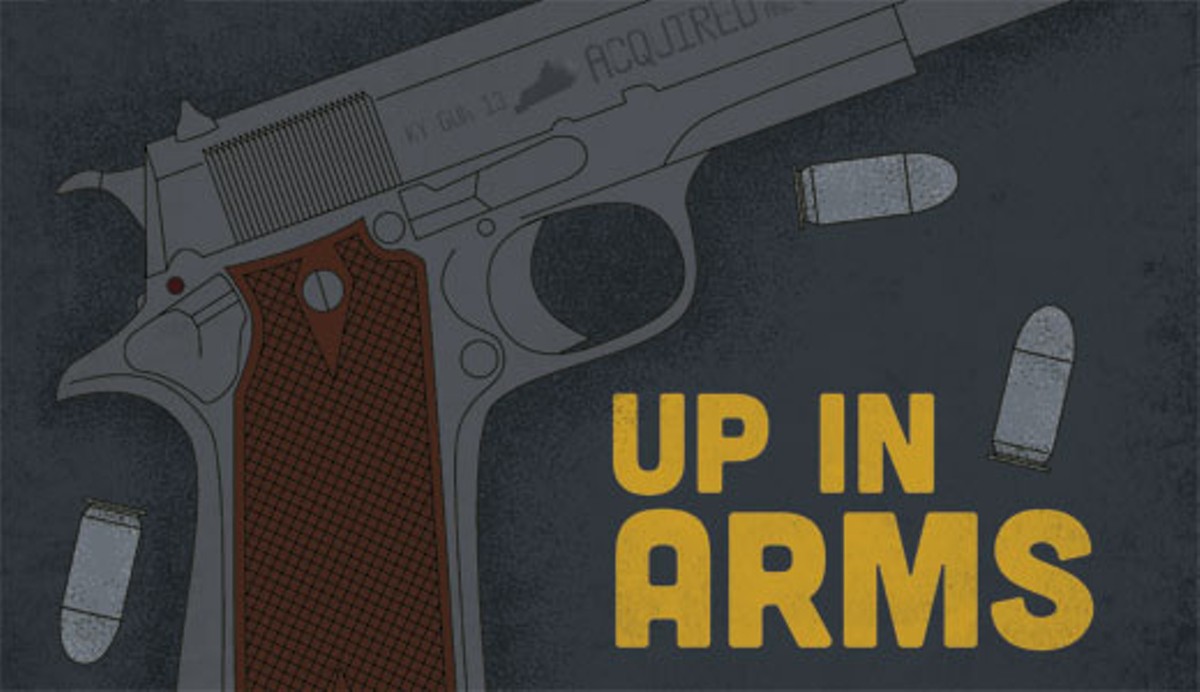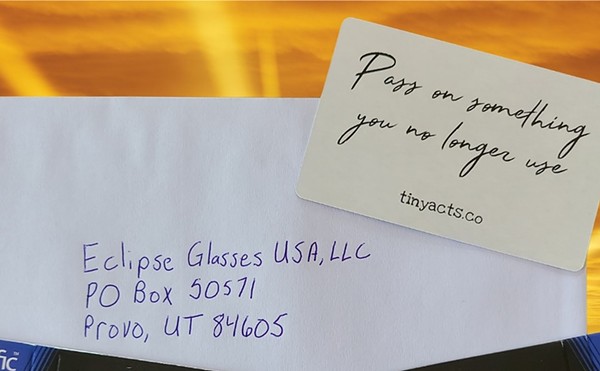Less than two weeks after the massacre at Sandy Hook Elementary School in Newtown, Conn., business is booming 800 miles away here at the Louisville Gun and Knife Show.
On the weekend of Dec. 29, 2012, hundreds of people pour into the West Hall of the Kentucky Fair & Exposition Center to purchase, sell, trade or otherwise ogle scores of knives and firearms before, as the mood suggests, President Obama takes those rights away. At the edge of one vendor’s booth, a wall of bumper stickers form a grid of anti-Obama, pro-Second Amendment sentiments: “Impeach Obama!” “Obama: Take These Guns From My Cold, Dead Hands!” “Socialist in Chief!”
In the lobby, ticketed sellers safely check their wares at the door, a table of inspectors ensuring the guns won’t discharge on the showroom floor. From there, they pass through a dimly lit hallway where a bearded man in camouflage fatigues sits in a wheelchair. The smell of gun oil and stale popcorn taints the air. “Would you like to make a donation on behalf of America’s veterans?” the man says, motioning to a glass jar half-stuffed with wadded dollar bills and coins.
Inside, the nearly standing room-only show feeds attendees through a maze of aisles lined by contiguous rows of vendor tables, people lined up in serpentine fashion throughout the cramped exhibition hall amid a din of conversation. For sale: guns; knives; guns with knives attached; gun holsters; gun accessories; gun powder and bullet shell casings with which to manufacture ammunition; war memorabilia; survival manuals (zombie-apocalypse themed alongside military-issued chapbooks); tasers disguised as mundane objects like cell phones or flashlights; ammunition clips and magazines; National Rifle Association stickers, pins, flags, shirts and more.
In the corner of the hall, two men haggle over the prices of a trio of rifles balanced on top of a trashcan.
It’s not altogether different than an indoor flea market, or a home and garden exposition, or a technical trade show — the key difference being that instead of pallets of bric-a-brac or mock-installations of kitchen countertops, the wares here can be used to efficiently murder large numbers of people in small amounts of time and are the subject of intensifying federal efforts to control their manufacture and sale in the wake of the nation’s latest mass shooting.
“Won’t be long before you can’t even buy these,” says one vendor. “It’s probably gonna happen.”
Among the dozens of vendors, a handful sell the now-infamous Bushmaster AR-15s, virtually the same make and model of the Bushmaster XM15-E2S semi-automatic rifle that Adam Lanza primarily used to fire dozens of .223 caliber rounds into 20 children and six adults on Dec. 14, 2012, in the hamlet of Newtown. The average asking price is $1,200 per rifle.
I approach several vendors selling AR-15s, and only one mentions he would have to conduct a background check if he were to sell the semi-automatic firearm in question and that he couldn’t sell to me if I were a felon. The rest require only a copy of a driver’s license for their own record-keeping purposes. One vendor in particular states that such information would not be shared with any public or private agency.
“It’s between us,” he says. “It’s my individual gun, and I keep track of who I sell it to.”
Under Kentucky law, private firearms collectors are not required to conduct mandatory background checks on individuals to whom they sell guns. Kentucky is one of 33 states to make such checks voluntary. Currently, there is no federal provision to counteract this so-called “gun show loophole,” whereby sellers routinely decline to conduct background checks on their customers.
RK Gun Shows, the Iowa-based company that conducts the Louisville Gun and Knife Show, did not respond to requests for comment on this story.
According to the Bureau of Alcohol, Tobacco, Firearms and Explosives, the Louisville Gun and Knife Show is one of an estimated 5,000 gun shows that take place annually in the United States, and the business conducted there represents a sliver of national firearms transactions. Firearms sales figures remain nebulous, partly because of successful lobbying by the National Rifle Association to prevent weapons manufacturers from disclosing any sales data to the federal government.
The ATF estimates that 40 percent of gun show sellers are unlicensed and largely anonymous — sellers like Louisville resident Jerry Milton (whose name has been changed for this story). The 26-year-old briefly attended the show on Saturday and sold three firearms — a Ruger Super Red Hawk .34 magnum, a Mosin-Nagant rifle, and a Taurus .357 magnum snubnose revolver. He made the sale in under five minutes, in the lobby, without ever having to buy a ticket. Milton made an even $800 — the amount he originally paid.
U.S. Rep. John Yarmuth (D-Ky.) became one of the first members of Congress to call for new, tighter gun control laws in the immediate aftermath of the Sandy Hook shooting.
“I have been largely silent on the issue of gun violence over the past six years, and I am now as sorry for that as I am for what happened to the families who lost so much in this most recent, but sadly not isolated, tragedy,” he said in a statement that, in part, admonished the NRA for making lawmakers afraid of its lobbying power and political philosophy. “The answer simply cannot be a gun in every elementary school lunchbox.”
Yarmuth is a co-sponsor of the High Capacity Ammunition Feeding Device Act, which was originally part of the so-called “Assault Weapons Ban” that expired in 2004. The bill would ban the sale or transfer of ammunition magazines holding more than 10 rounds. He also supports H.R. 591, aka the Gun Show Loophole Closing Act; Yarmuth believes that requiring background checks for all gun sales, especially those at gun shows, is “the No. 1 thing” that’s going to curb gun violence.
“In California, they put their universal background check law into effect, and the likelihood of a gun bought in California being used in a crime is seven times less than in a state without background checks,” he tells LEO Weekly. “So, clearly, these laws have a very, very significant effect on gun violence.”
Enacted in 1991, the California background check system — which many political observers are touting as a potential national model for universal background checks — denies 1 percent of purchasers, according to statistics published by the Oakland Tribune. That’s better than the .6 percent denial rate under the FBI’s National Instant Criminal Background Check System (or NICS), implemented in 1998 as mandated by the 1993 Brady Handgun Violence Prevention Act.
But federal audits and media reports have revealed the NICS to be little more than a patchwork of sparse records, in part due to lax or nonexistent state laws regarding gun registration, or file-sharing restrictions between state governments and their federal counterpart. According to NICS data compiled by Mayors Against Illegal Guns, the vast majority of persons who fail a background check are felons or those who have served two years in jail. Most background checks are conducted by businesses, like Walmart, or gun stores, which must adhere to the NICS, unlike private sellers operating within the gun show loophole.
Last year, Kentucky led the nation in the number of firearm background checks. According to data from the FBI, gun sellers and law enforcement agencies in Kentucky requested 2.3 million checks in 2012.
Kentucky, however, does not require purchasers to apply for permits except if the gun owner wishes to carry their weapon concealed, and the higher-than-average rate is attributable to the fact that state authorities conduct monthly background checks on those with concealed carry licenses, which are easy to obtain. (See “Trigger happy: Is it too easy to get a concealed carry gun license in Kentucky?” LEO Weekly, July 15, 2009.)
But as a Dec. 20, 2012, New York Times article noted, significant flaws with the FBI’s system have led to untold scores of Americans obtaining firearms who would otherwise be prohibited from gun ownership. Such flaws were present in the case of Seung-Hui Cho, the shooter in the 2007 Virginia Tech Massacre, whose mental illness records were not transmitted to the NICS database and were, therefore, not marked as a red flag in the system.
But no one bill or solitary measure can solve the complicated crisis of gun violence, Yarmuth says. He recognizes that there is a huge difference between spree shootings like those in Newtown and the routine gun violence that plagues cities.
“Poverty, joblessness, gangs — there are a lot of factors, but certainly easy access to guns is a major contributing factor. There were three murders right after Sandy Hook in Louisville,” he says, echoing the findings of the Louisville Violence Prevention Workgroup study, commissioned by Mayor Greg Fischer in an attempt to address a spate of shootings that rocked the city in the summer of 2012.
In comments made after his State of the City Address at the Kentucky African American Heritage Center, Fischer outlined his support for various gun control measures, including improved background checks and a ban on assault weapons.
“The founding fathers never thought we would have assault weapons, that people could come into a building like this and mow half of us down in a minute,” Fischer said.
Louisville politicians stand in contrast to the state-at-large, pitting concerns over urban violence against an unfettered Second Amendment favored by rural constituents. Few states offer as perfect a microcosm of this dichotomy as Kentucky, whose agrarian, frontier past has collided with the modern realities faced by its largest city, Louisville, which witnessed 69 gun-related murders last year — a 21 percent increase over the previous year.
Nearly a month after the Sandy Hook shooting, U.S. Rep. Thomas Massie (R-Ky.) offered his own take on a solution. On Jan. 4, 2013, the freshman congressman introduced the Citizens Protection Act, a bill originally introduced in 2007 by Texas Congressman Ron Paul that would repeal the Gun-Free School Zones Act of 1990 and permit teachers, parents or visitors to carry firearms into schools across the nation.
“Gun-free school zones are ineffective. They make people less safe by inviting criminals to a target-rich, no-risk environment,” Massie said in a statement. “A bigger federal government can’t solve this problem. Weapons bans and gun free zones are unconstitutional. They do not and cannot prevent criminals or the mentally ill from committing acts of violence. But they often prevent victims of such violence from protecting themselves.”
Jason Gainous, an associate professor of political science at the University of Louisville, reasons that this kind of debate knocks the dust from familiar “culture war” rhetoric, once more pitting urban centers like Louisville, and its phenomena of drug- and gang-related violence, against their rural counterparts, who see their way of life as under siege by an overreaching, activist liberal government.
“The history of guns in this state is going to be reflected in this cultural divide you see nationally,” Gainous says. “I think that the gun control debate is not even about whether gun control is going to be effective or not. I think it’s more rooted in these major cultural differences that are symbolized through the gun control debate.”
He says a perfect example of the disconnect between these cultural differences is Metro Council’s recent passage of a revised Deadly Weapons Ordinance, which classifies items like knives, nightsticks and nunchucks as deadly weapons. A new NRA-backed state law passed last year prohibits the council and other municipalities from classifying firearms as deadly weapons. According to the law, that ability to regulate firearms is only afforded to the state legislature.
In a statement to WDRB about the amended ordinance, Assistant Jefferson County Attorney Bill O’Brien said, “We can control someone running around with a large machete, we can control (as a former alderman suggested) nuclear arms. We can’t control firearms.”
Other examples of this Kentucky disconnect abound: A recent campaign email blast from Sen. Mitch McConnell warned constituents that President Obama would more or less come into their homes, take their guns, and smelt them into the foundation of a liberal dystopia; Kentucky House Speaker Greg Stumbo, a Democrat from Prestonsburg, backed a successful amendment last year to the state’s own constitution that preserves hunting as a “way of life” among Kentuckians; Gov. Steve Beshear, a Democrat, championed the aforementioned NRA-backed deadly weapons bill, which was originally sponsored by state Rep. Bob Damron, also a Democrat.
All of these examples, Gainous says, represent the pure political exploitation of these rural values that cast off labels likes Democrat and Republican, leaving behind cultural levers, which, when pulled, motivate voters. It’s a time-honored political process that he says likely will never end.
Despite the cultural division, Gainous notes that there’s a lean in the state and the country toward more support for new gun restriction laws. On the state level, he cites a recent Courier-Journal Bluegrass Poll that reveals a majority of Kentuckians support certain gun control measures: 75 percent support background checks on gun buyers, even if the sale is between private parties; 65 percent support a law that requires guns to be registered with the state; 53 percent support a law that limits how much ammunition can be purchased at one time; 51 percent support a limit on how much ammunition a gun can hold at once.
But Gainous notes a caveat buried in the poll: 60 percent believe protecting their right to own a gun is more important than the implementation of new gun restrictions.
“Gun culture is too ingrained in the very culture of our society,” he says. “I don’t think it’s ever going to go away.”
Neither does Dea Riley. As former running mate of the late Gatewood Galbraith, Riley spent several months on the campaign trail with the perennial candidate, who was widely renowned for his libertarian stances on issues and even published an autobiography-cum-manifesto, “The Last Free Man in America,” that featured a picture of himself on the cover, smiling and wielding an M60 machine gun.
“Gatewood was an ardent supporter of gun ownership,” she says. “I’ll quote Gatewood, which I feel sums up his stance: ‘A pistol is what you carry with you so you can hold off the bad guys until you can get to your vehicle where you keep the big shit.’”
But despite their shared advocacy of a right to bear arms, neither Galbraith nor Riley supported the NRA.
“Although I am a gun owner, I feel no particular interest to belong to the group,” she says. “I am not in 100 percent agreement with the entirety of their mission statement, their tactics, nor overbearing lobbying influence. Gatewood wasn’t a fan of the NRA and felt they were more interested in fundraising and politics than any actual service to members.”
Riley believes Gatewood would have, like herself, “been reasonable” in this debate and supported “better gun policy” while remaining an “ardent advocate for the Second Amendment … same as myself.”
This balancing act between support for the Second Amendment and recognizing a need for action in the wake of Sandy Hook is not lost on Jerry Milton, our anonymous gun peddler at the Louisville Gun and Knife Show.
Like most American gun owners, Milton doesn’t own just one. After his purge at the gun show (urged in part by his non-gun loving wife), Milton is down to four firearms. They’ve been a part of his life since he was a kid, with an extended family littered with recreational hunters.
Milton’s favorite is a Winchester Super X Model 1 shotgun passed down to him by his grandfather, who taught him how to shoot.
“We’re open about guns,” he says. “I mean, we don’t talk about them all the time, but we all grew up around them.”
For years he was against any additional gun control and didn’t think too much about the issue — until Sandy Hook.
“I started thinking that something needs to be done,” he says. Milton favors closing the gun show loophole and making background checks mandatory — points that he feels don’t conflict with his support for the Second Amendment.
“I don’t necessarily agree with banning any specific gun, but I think it’s too easy, you know? Felons are not allowed to have guns, but without a background check, you could be selling to a felon or someone who’s underage,” he says. “It would’ve made it more inconvenient for me (to sell), obviously, and I would have made less money, but that’s not what’s important. That gun show opened my eyes to how easy it really is.”






